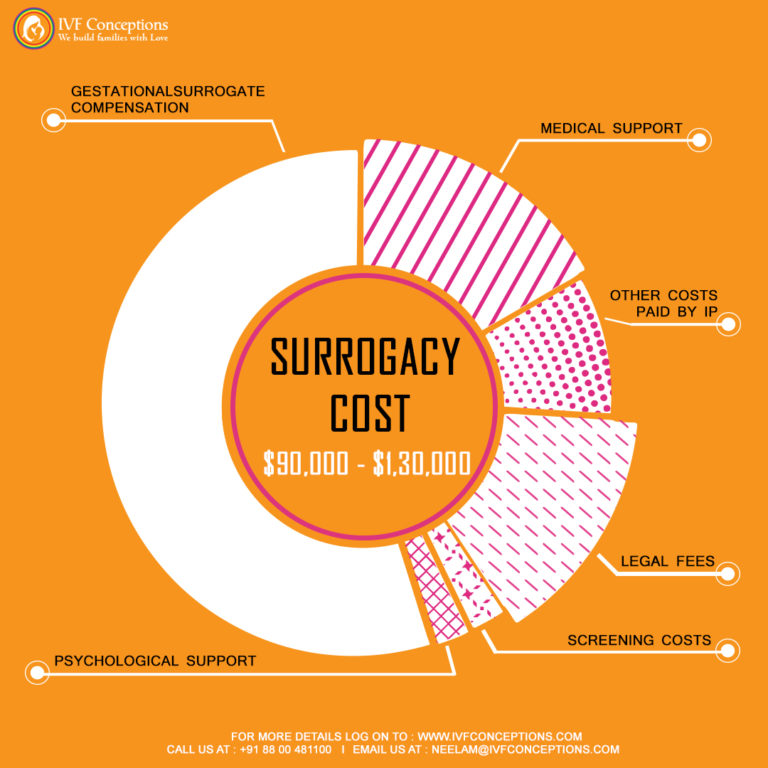Budgeting for Surrogacy: Your Comprehensive Guide to Affordable Parenthood


For many, surrogacy represents the best or only path to welcome a long-awaited child into their family. However, the costs associated with surrogacy in the USA arrangements can be daunting, often ranging from $90,000 to $130,000+ in total.
Comprehensive budgeting and financial planning are essential to make the journey manageable. This guide will walk you through the various surrogacy costs and help you create a realistic budget for surrogacy. In this guide, we will provide practical tips and strategies to help you financially prepare for surrogacy, including:
- Researching average costs and understanding what is involved
- Exploring more affordable surrogacy options
- Setting savings goals and increasing income to fund costs
- Creating a detailed budget tracking all anticipated expenses
- Navigating complex insurance coverage considerations
- Working with financial advisors to optimize your plan
- Adjusting your budget along the way as needed
Proper budgeting and preparation help ensure you can focus on the excitement of growing your family rather than financial stress. While surrogacy is a major investment, you can take control by thoughtfully planning each step of the process. Let’s begin by examining average surrogacy costs and what exactly your budget needs to cover.
Get in touch for a Free Surrogacy Consultancy:
📲 +91-8800481100 ( WhatsApp, Line, Viber)
Additional guide for Surrogacy Expenses:
Affordable Surrogacy Options in 2024
How to save for surrogacy costs
Surrogacy financial planning tips
Understanding insurance for surrogacy


Understanding the Costs of Surrogacy
While budgeting for surrogacy, it is good to know what surrogacy costs consist of. Surrogacy involves several key expenses, and understanding them is crucial for effective financial planning. Here’s a breakdown:
| Surrogacy Expense Category | Estimated Surrogacy Cost Range |
| Agency Fees | $15,000 – $30,000 |
| Surrogate Compensation | $30,000 – $50,000 |
| Medical Expenses | $25,000 – $35,000 |
| Legal Fees | $7,000 – $15,000 |
| IVF Costs | $12,000 – $20,000 |
| Pregnancy and Delivery | $8,000 – $15,000 |
| Miscellaneous | $5,000 – $10,000 |
These costs can vary depending on your location and specific circumstances, so it’s crucial to consult with surrogacy agencies and medical professionals to get accurate estimates.
To create an accurate budget, you first need to understand the major costs involved in the typical surrogacy process: Total Average Surrogacy Costs – The all-in cost for surrogacy in the USA ranges from $90,000 to $130,000 on average. Higher if complications occur.
- IVF Expenses –The medical procedures like egg retrieval, lab work, and embryo transfer cost $15,000 to $30,000 per cycle.
- Agency Fees –Surrogacy agencies charge $15,000 to $30,000 for coordination, matching, legal support, and case management.
- Insurance –Monthly premiums for a surrogacy policy average $1,000 to $2,000 for adequate pregnancy coverage.
- Legal Fees –Lawyers for both parties cost $10,000 to $15,000 total for contracts and consultations.
- Surrogate Compensation –The surrogate’s base pay averages $35,000 to $50,000. Additional compensation may be requested.
- Other Costs –Travel, medical care, lost wages, counseling, and other expenses add thousands more.
Surrogacy Budget Planning
Creating a surrogacy budget is the first step toward financial preparedness. It’s vital to itemize all potential expenses and set a realistic financial plan.

 Creating Your Surrogacy Budget
Creating Your Surrogacy Budget
If you are planning to do your surrogacy journey in the USA, a careful assessment of cost and financial planning is an important initial step. Let’s see some factors below that you might consider before starting your surrogacy journey.
- Assess Your Financial Situation: Before you embark on the surrogacy journey, take a close look at your current financial situation. Evaluate your income, savings, and expenses to determine how much you can allocate to surrogacy without compromising your financial stability.
- Research Surrogacy Agencies: Choose a reputable surrogacy agency that aligns with your budget. Compare agency fees and services offered by different agencies. Look for reviews and recommendations to ensure you select a trustworthy partner in this process.
- Surrogate Compensation: The compensation for your surrogate is a significant expense. Discuss compensation terms with your chosen surrogate, taking into account her needs and expectations.
- Medical Expenses: Consult with fertility clinics and healthcare providers to understand the full scope of medical expenses. This includes IVF treatments, prenatal care, and delivery costs.
- Legal Fees: The legal aspects of surrogacy are complex. Hire an experienced attorney to handle the legalities. Discuss fees upfront and ensure transparency regarding costs.
- IVF Costs: IVF is a critical step in the surrogacy process. Research IVF clinics and their pricing. Some clinics offer packages that cover multiple IVF cycles.
- Pregnancy and Delivery Costs: Factor in costs related to prenatal care, ultrasounds, and delivery. These costs can vary depending on the surrogate’s location and her insurance coverage.
- Miscellaneous Expenses: Be prepared for unexpected costs, such as travel expenses, maternity clothing, and any additional support or services required during the surrogacy journey.
Additional Resources:
Everything You Need To Know (in 2024)
How Much Does Surrogacy Cost Using Family Member
Can My Insurance Provider Pay My Surrogacy Costs?
How Much Does Surrogacy Cost in the USA ( 2024)?
Surrogacy Costs Breakdown for Intended Parents


Affordable and Lower-Cost Surrogacy Options
For many intended parents managing high surrogacy costs is a big issue. So, they try to cut the costs here and there. However, it is good to know what are the areas where you cannot afford to cut the cost, like legal and medical aspects.
Saying this, still, you can use the below consideration to reduce the surrogacy cost. While traditional surrogacy costs well over $100,000, there are some more affordable options to consider:
Shared Journeys – Intended parents share donor eggs and one surrogate to save on expenses. However, you need to consider the legal side of this process along with the chances of success.
Reciprocal IVF – Lesbian couples exchange eggs and gestate for each other. Removes donor costs.
Emerging Regulations – Some states now mandate insurance coverage and open access.
Inclusive Programs – Non-profits and clinics offer more affordable packages and financing help.
Discounted Providers – Seek out lower-cost clinics, agencies, and attorneys willing to discount fees.
Bundled Discounts – Ask providers for packaged pricing when using their combined services.
Shared Risk Programs – Payments are refunded partially if IVF fails. Offsets some financial risk.
Guaranteed Baby Plan- These are the costs, where you know from the beginning how much will be your total expense. These are fixed-cost programs that give you peace of mind and your financial risks are covered. Such Fixed-cost guaranteed baby plans are common outside the US due to low medical expenses.
While not “cheap,” these options may save $10,000+ in certain circumstances. Discuss creative, ethical ways to lower costs with your team. International Surrogacy Countries- Most of the intended parents choose surrogacy abroad and there is a reason for it.
The cost of surrogacy outside the US is 50% to 70% less than a typical surrogacy price in America. The most important consideration is to choose a surrogacy country that has a safe legal framework and protects your right and your baby’s right. After that choose a surrogacy agency or surrogacy clinics which are reliable and experienced.
As you are in a different country and not all what you find on the internet can be trusted reach out to a reputed and trusted surrogacy consultant who might help with surrogacy abroad options that are reliable and secure.
Affordable Surrogacy Options in 2024
When considering surrogacy, look for affordable options that align with your budget. It’s essential to research and compare various agencies and providers to find cost-effective solutions.
Surrogacy Financial Assistance
Surrogacy financial assistance can come in the form of grants, scholarships, or even insurance coverage. Exploring these avenues can significantly ease the financial burden.
Surrogacy Grants and Scholarships
Many organizations offer grants and scholarships to individuals or couples seeking surrogacy. These can be a valuable resource to help cover some of the costs.
Surrogacy costs resources worldwide:
Top 4 cheapest countries for surrogacy
Best Countries for Surrogacy 2024- Top International Destinations
Risks of international surrogacy
Global International Surrogacy Options
Low-cost surrogate mother in Argentina
Low-cost surrogate mother in Kazakhstan
Cheapest countries for surrogacy:
| Country | Regulation & Organization | Who are allowed to participate | Surrogacy Cost | Legal Assurance |
| Colombia | Altruistic | Singles, gay couples, hetero couples | Affordable $70,000 | Reliable |
| Mexico | Altruistic | Singles, gay couples, hetero couples | Affordable $70,000 to $80,000 | Reliable |
| USA | Commercial | Singles, gay couples, hetero couples | Costly $150,000+ | Strong |
| Ukraine | Commercial | Hetero couples | Affordable $60,000 | Strong |
| Georgia | Commercial | Hetero couples | Affordable $60,000 | Strong |
| Greece | Altruistic | Hetero couples and single women | Affordable $80,000 | Strong |


How to Save and Prepare for Surrogacy Expenses
How to Save for Surrogacy Costs?
Saving for surrogacy is a crucial aspect of financial planning. Explore budgeting strategies and financial planning tools to help you save effectively. How can you proactively save up and prepare for surrogacy costs?
Consider these strategies:
- Set a Savings Goal – Determine the total funds you will need and set a monthly savings target. Opening a dedicated surrogacy savings account can help.
- Reduce Discretionary Spending – Cut back dining out, entertainment, vacations, and other non-essential expenses temporarily to allocate more towards surrogacy savings.
- Increase Income – Consider taking on freelance work or a second job if possible to bring in more money dedicated to your goal.
- Borrow from 401(k) – Many plans allow borrowing against your balance for medical reasons. This avoids high-interest debt.
- Peer-to-Peer Loans – Services like LendingClub connect lenders willing to finance at reasonable rates. More flexible than banks.
- Crowdfunding – Launch a surrogacy fundraising campaign through GoFundMe or a similar site. Share your story.
- Grants and Aid Programs – Research organizations and non-profits providing financial aid grants and scholarships for infertility treatment.
How To Create a Detailed Surrogacy Budget
Now, finally, you know how much you can spend on your surrogacy process, the next step is managing it. The key to managing surrogacy costs is creating a comprehensive budget tracking all anticipated expenses. Here are some tips:
- Do thorough research on average costs for your circumstances. Get detailed estimates from your agency and clinic.
- Track both fixed expenses like IVF that are known upfront, as well as variable expenses that may fluctuate.
- Build in cushions for unexpected medical bills, travel costs, legal changes, and other contingencies.
- Consult with financial professionals to optimize tax deductions, credits, insurance, and estate planning.
- Use budgeting software or spreadsheets to monitor projected vs. actual spending over time.
Updating your budget frequently ensures you catch any diverging costs early. This allows you to adjust savings or financing if needed.

 Understanding Surrogacy Insurance Coverage
Understanding Surrogacy Insurance Coverage
Due to high medical procedure costs in the US, opting for medical insurance coverage is absolutely necessary for a surrogate mother. Navigating insurance for surrogacy can be complex and risky if not addressed properly:
- Review your existing health insurance policies closely for coverage of infertility, pregnancy, and more. This varies widely.
- Speak to your insurer about additional riders or add-on policies to cover potential surrogacy costs.
- Your surrogate must be properly insured as well, often requiring a separate surrogacy policy at additional expense.
- Research state laws – some mandate infertility and surrogacy coverage while others prohibit it.
- Even with insurance, significant out-of-pocket costs often still arise for deductibles, copays, uncovered care, etc.
- Be prepared to pay upfront for expenses that you will need to submit claims and get reimbursed for later.
Consult with an insurance broker or agent experienced in surrogacy and reproductive treatments to ensure you select adequate, cost-effective coverage.
Working With Financial Professionals for Budgeting for Surrogacy
It’s wise to assemble a team of financial professionals to optimize planning for significant expenses like surrogacy: Accountant – Review tax deductions for medical costs and child tax credits to minimize your tax burden before, during, and after surrogacy.
Insurance Agent – Help navigate complex insurance coverage issues and ensure you have adequate affordable policies in place.
Financial Advisor – Develop a comprehensive long-term financial plan factoring in income loss, estate planning for your future family, and more.
Lawyer – Provide guidance on any legal considerations related to finances, such as protecting assets and inheritance planning.
Lender – If financing any costs via loans or lending agreements, work with reputable lenders and set clear terms. Lean on your financial team to help guide discussions with your agency, clarify budget questions, optimize savings, and provide general support throughout the process. Keep in mind that flexibility is the key and do adjusting your budget along the way.

 Conclusion and Next Steps
Conclusion and Next Steps
We hope this guide has equipped you with the knowledge and tools needed to approach budgeting for surrogacy thoughtfully and strategically. While certainly an expensive process, you now have tips to help finance this life-changing journey through careful planning, saving, and support. Key takeaways include:
- Research all costs thoroughly and get detailed estimates upfront
- Pursue affordable programs and discounts when possible
- Set savings goals and increase income to fund surrogacy
- Create a living budget that you monitor and adjust along the way
- Opt out for legal international surrogacy countries that are legally secure and affordable with low-cost surrogate mothers and good quality medical services.
Remember that every surrogacy journey is unique, so tailor your budget to your specific circumstances. Seek guidance from professionals, stay organized, and maintain open communication with your surrogate and surrogacy agency to ensure a smooth and financially manageable experience.
If you’d like to learn more about IVF, Egg Donation, or surrogacy services globally, check out the rest of our website at IVF Conceptions.
We offer legally secure and affordable surrogacy consulting services for FREE. Our team has over 13 years of experience facilitating surrogacy arrangements, egg donation, and serving as an advocacy resource for infertile couples and LGBTQ individuals seeking to build families.
Get in touch for a Free Surrogacy Consultancy:
📲 +91-8800481100 ( WhatsApp, Line, Viber)

 FAQs for Budgeting for Surrogacy:
FAQs for Budgeting for Surrogacy:
- What are the key factors to consider in surrogacy budget planning?
Key factors in surrogacy budget planning include understanding surrogacy costs, exploring affordable surrogacy options in 2023, seeking surrogacy financial assistance, and creating a comprehensive budget that incorporates surrogacy insurance coverage.
- Are there financial assistance options for surrogacy?
Yes, there are financial assistance options for surrogacy, such as surrogacy grants and scholarships, which can help alleviate some of the financial burden. Additionally, some organizations offer financial planning tools to aid in creating an effective surrogacy budget.
- What role do surrogacy agencies play in budgeting for surrogacy?
Surrogacy agencies are a significant part of surrogacy budget planning. Their fees should be factored into the budget, and it’s essential to choose an agency that aligns with your financial plan.
- Is insurance coverage available for surrogacy?
Yes, insurance coverage for surrogacy is available, but it’s important to thoroughly understand what is and isn’t covered. This understanding is crucial in surrogacy budget planning.
- What are some effective budgeting strategies for surrogacy costs?
Effective budgeting strategies for surrogacy costs include researching affordable surrogacy options, utilizing financial planning tools, exploring surrogacy insurance providers, and seeking financial assistance through surrogacy grants and scholarships.
- How can one save for surrogacy costs?
Saving for surrogacy costs involves creating a detailed surrogacy budget, implementing budgeting strategies, and exploring financial assistance options like surrogacy grants and scholarships. This comprehensive approach can help you save effectively for surrogacy expenses. References:
Read more: completesurrogacy.com